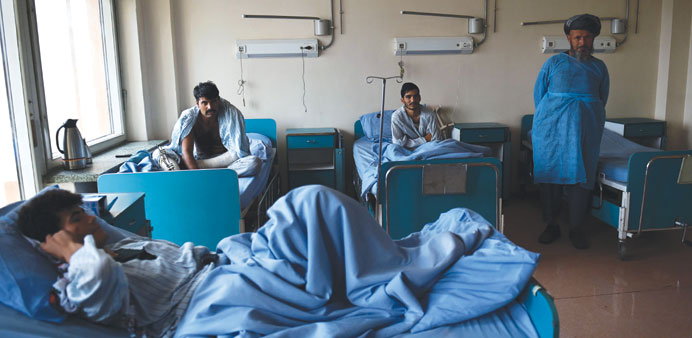AFP/Kabul
The injured Taliban fighter stands shackled, with his face covered by a ski mask and wearing a helmet to block out noise so that, for security reasons, he cannot tell where he is.
The insurgent was wounded while battling the Afghan army and is now flanked by soldiers throughout his medical treatment at the nation’s largest military hospital.
He is cared for alongside the very men whose comrades he once faced in battle, and the troops are furious about the arrangement at Kabul’s Sardar Mohamed Daoud Khan hospital.
“We are treated in the same place, it’s very strange but there is nothing I can do,” says Mohammed, a soldier with a bullet wound to the leg who is just two rooms away from his enemy.
“Senior people make these decisions for us. It’s appalling,” he added. The Taliban “have no dignity... they don’t have enough courage to be soldiers so they destroy our country and kill”.
The policy to treat Taliban fighters who have waged a decade-long insurgency in Afghanistan is a sore point at a time when casualties among security forces are soaring.
More than 4,000 Afghan soldiers and police were killed and over 8,000 wounded in the first half of the year, compared to 5,000 who lost their lives in the whole of 2014, and the loss of life continues.
The issue was brought sharply into the spotlight in October, when 30 people were killed in a US air strike on a hospital run by French charity Doctors Without Borders (MSF) in the northern city of Kunduz.
Afghan authorities have long criticised the charity for treating Taliban fighters as well as soldiers inside its walls.
The US military put the bombing down to “human error”, while MSF has branded it a war crime and demanded an independent probe into the strike.
With some 400 beds, the Sardar Mohammed Daoud Khan facility is the jewel in the crown of the Afghan health service and it receives dozens of soldiers every day who have been wounded fighting the Taliban, as well as insurgents.
“Where does it hurt?” one doctor asks the wounded militant, a prisoner at the military jail in Bagram, north of Kabul.
“Here and there,” replies the man, pointing to his chest.
A senior hospital official said he has only been brought “to the hospital for a few hours, the time it takes for a consultation”.
Kabul has played down the thorny subject, only quietly admitting that Taliban fighters are indeed treated.
“It’s true, but we don’t talk publicly about it,” said a government source on condition of anonymity.
The American head of the Nato mission in Afghanistan declined to speak about the practice, despite repeated requests for comment by AFP.
That US funds could be paying to treat Taliban fighters is potentially embarrassing for Washington, which spent at least $185mn on Afghanistan’s military health system between 2002 and 2011.
Officials at the hospital say they are abiding by laws enshrined in the Geneva conventions, which says those involved in conflict should not be left without medical treatment regardless of race, political opinion, religion or gender.
“We respect international law and we want that, when the Taliban are released, they tell the other fighters that we acted like good Muslims,” said a senior hospital official who asked to remain anonymous due to the sensitivities surrounding the issue.
“The more violent the fighting, the more patients we receive,” said hospital doctor Nasruddin Amin.
But that care has not yet extended to Islamic State fighters, who control swathes of territory in Syria and Iraq under their own brutal interpretation of Shariah law and have been gaining ground in Afghanistan.
For now, the official said there are no Islamic State fighters in the Mohamed Daoud Khan military hospital.
But, when the time comes, Dr Amin said he would treat them like any other who enters his care.
“I am a doctor, I am not a state prosecutor,” he said.

Wounded Afghan National Army soldiers sit on beds on a ward at Sardar Mohamed Daoud Khan Military Hospital in Kabul.
